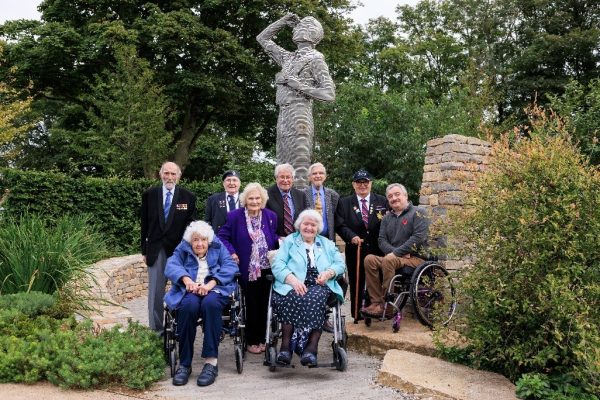WW2 RAF veterans recall wartime memories this Remembrance Day

Caption: (Back row L-R) Veterans Albert Howard, David Curd, Sybil Piper, Aviation Historian and Writer Robin Brooks, John Hext, Reg Lawrence, Fund Ambassador Bob Greig. (Front row L-R) Veterans Margaret Garrett and Alice Judge, at the RAF Benevolent Fund’s The Strongest Link Garden at Biggin Hill Airport.
To mark Remembrance Day on 11 November 2023, the RAF Benevolent Fund, the RAF’s leading charity, spoke to a group of the last remaining Second World War veterans who gathered for an afternoon at Biggin Hill, home to the Battle of Britain.
The meet was co-facilitated by the RAF’s leading welfare charity, the RAF Benevolent Fund and the team at Biggin Hill Airport, who welcomed the veterans to walk around the Fund’s Strongest Link Garden, designed by John Everiss, originally showcased at the Chelsea Flower Show in 2022, and catch up with each other over tea and cake.
Warrant Officer Albert Howard – Former No.47 Squadron Navigator
Warrant Officer Albert ‘Foo’ Howard DFC, 100, (101 on 5 November) from Essex, was a No.47 Squadron Navigator who flew on
Beaufighters and Mosquitos in north Africa and Asia during the Second World War.
Joining No. 47 Squadron in 1943, Albert saw action across the Eastern Mediterranean, including bomber escorts and numerous naval escort and torpedo attack missions.
Born in 1922, Albert recalls childhood memories following the First World War. He said:
“My family were part of the war, in the First World War, and that’s why it’s such a personal thing it seems. I was a child that was just born at the First World War and that’s a [memory] that comes really deep.
“My father got injured, and gassed as well, and I was fed on that from then until the Second World War started. [I was taken] through all the rubbish and bomb damage that was done, and that inflicted a memory that just doesn’t go. You can always remember that. You can always remember that because there’s so many people that have been ruined; their whole family ruined. You can’t get over that sort of thing, you can’t talk your way through it; it’s difficult at that age.”
LAC(W) Margaret Garrett – Former 5 Group Bomber Command
Leading Aircraftwoman Margaret Garrett, 101, from Guildford, was a Meteorologist and part of 5 Group Bomber Command based at RAF Waddington and RAF Wigsley during the Second World War.
Margaret described her most memorable moments. She said:
“I nearly got killed by a flying engine. I was in the control tower on my own and I saw a plane coming in on fire – which was very often usual.
“Then I saw the engine nearest to me detach itself from the fuselage and fly through the air, this burning object, straight for the window. I ducked under the teleprinter, which wouldn’t have been much hope, and it just landed in front of the window. So that was my hairy moment!”
Speaking on why Remembrance Day is important to her, Margaret said:
“It is a momentous day. My husband was out on D-Day, so I really had a worrying war, one way or the other. You’ve got to remember how many people lost their lives. It’s incredible when you look back. I don’t think in everyday life you think about it very much – but you should.”
Sybil Piper – WAAF Clerk, Special Duties – Bletchley Park
Sybil Piper, 96, from Aldershot, Hampshire, was a Special Duties Clerk at Bletchley Park during the Second World War.
The UK government acquired Bletchley Park in 1938 and made it a station of the Government Code and Cypher School (GC&CS), designated as Station X.
At the start of the war in 1939, the station had only 200 workers, but by late 1944 it had a staff of nearly 9,000, working in three shifts around the clock. Experts at crossword-puzzle solving and chess, as well as mathematicians and scientists, were among those who were hired. About three-fourths of the workers were women.
Sybil said:
“We did all the aerial – we were the only unit in the whole country that dealt with all the aerial work, so we were responsible for all the flying. I have worried memories of coping and having to coordinate maps. At Bletchley, we had all the same people in our house, all different uniforms, different countries, different languages, and top secret! You wore a ‘secret’ badge all the time. It was very frightening. At times, I cried, and others cried with me because we found it so demanding. We all had to work together.”
Speaking to Sybil about why Remembrance Day is important to her, she said:
“When you think of all the people who gave their lives for us for a better world – we should thank them for what we have received today and what we are receiving, the people that lost their lives or have suffered over the years.”
Sybil continued:
“My heart and my thoughts will be with people that have suffered, mentally and physically, due to wars.”
Air Vice-Marshal Chris Elliot, Controller of the RAF Benevolent Fund, said:
“This is a very special time of year, where we as a nation have the opportunity to reflect on the selfless acts of the people in our Armed Forces, what they have done and continue to do to keep us and our families safe and secure. It is also an opportunity for us to remember the sacrifices that many make in the course of their duties, many making that ultimate sacrifice, giving their lives for us.
“By committing to the act of Remembrance, we can collectively show that we are there for our serving personnel and their families, veterans, cadets, and reservists, now and for the future and thank them for what they continue to do for us, especially in these challenging times.
Chris continued: “For over 104 years the RAF Benevolent Fund has provided life changing support to those who have served, those who still serve and their families. We remain steadfast in our commitment and the Fund remains here for our RAF Family now and for the future.”
